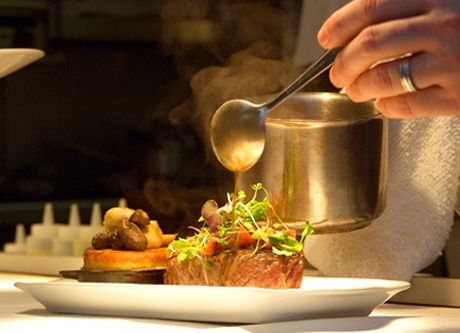 Continued from Part 4: Steve Beckta Restaurant
Continued from Part 4: Steve Beckta Restaurant
Tonight, though, there are no kids in the place; and the adults have moved beyond their starters to the main courses. In the kitchen, the first ripple hits the entrée station.
Vardy, now standing between Fraser and cook J.P. Filion, tapes his wristwatch to the beam of his station.
“How long you looking at Ross?” Vardy asks.
“Five minutes,” Fraser replies.
He’s searing foie gras, which will be topped with a caramelized blini made by Filion and then Vardy will finish them both with apple butter.
In minutes Fraser and Filion contribute their pieces of the dish; Vardy arranges it, then wipes the plate edges clean and then hands it to Morris, hovering calmly on the other side of the pass. Each plate is a team effort, and one cook can easily throw the others off.
“Did you get the amuse to table one?” Vardy asks Prevost.
“Yes chef!” she replies.
Fraser salts a piece of glistening red steak as tenderly as he’d tuck a blanket under an infant’s chin. The steak goes into one pan that he flips on to the stove with his wrist gunslinger style, while he holds another one that’s flaming. (Apparently, Fraser’s pants once caught fire and he didn’t walk any quicker than usual to the bathroom.)
Unlike the television reality show The Restaurant, Beckta hasn’t hired incompetent actors who simply want prime-time exposure for their resumé.
No one has quit or been fired since Beckta’s opened. Nobody is working just to pay their way through for college: the staff here has made restaurants their career.
As a result, there’s a disappointing lack of chaos for the writers who profile the place.
When the Food Network crew came to film Beckta’s for its new series Opening Soon, the producer was frustrated with the calm organization of the place: there were no frying pan fights, no sexual liaisons in the storage room and no blue-flame language that fill Anthony Bourdain’s exposé Kitchen Confidential.
(Though every time I return to the kitchen after a break, Fraser deadpans that I’ve just missed an awesome fight between the pastry chefs or the racy excitement of Vardy making a move on him.)
Now the kitchen is becoming like an emergency room, with Vardy the receiving medic.
He tears off the ticker-tape of orders printing out steadily above his station and calls them out: “We have one pig, one beef, one scallops and two medium steaks.” “This is Danny’s table: an egg, a pasta, a pig and one goat to share.”
Beckta pops in with a glass of wine. “Here chef, try this with the eggs,” he says. Vardy does, and screws up his nose in distaste. “Don’t like it?” Beckta asks undeterred. Wine is his passion and he loves finding a perfect match for the food.
This is one of the few restaurants in the city where the wine is as important as the food.
The basement cellar is a growing cache of fine selections from various regions, plus some of Canada’s cult wines: Gunther Funk, Malivoire, Peninsula Ridge and Lailey Vineyards.
As Beckta notes on the wine list, “most are made in small quantities by artisans whose craftsmanship and values we respect and embrace.”
Not only has Beckta invested in Riedel stemware, but he’s paying for Prevost to complete the fast-track sommelier program at Algonquin College, where he himself graduated with honours.
More unusually, he doesn’t treat his house wines as a vinous dumping ground.
Instead, he collaborated with Cave Spring Cellars in Niagara to blend his own Riesling and Gamay. They’re delicious, reasonably priced and offered by the glass along with twenty-two other wines.
If there are chef-owned back of the house restaurants and maitre d’-owned front of the house restaurants, then Beckta’s must be one of the first sommelier-owned, under-the-house restaurants.
Although wine is an important part of Beckta’s, it’s received surprisingly little attention in the restaurant reviews, with the exception of Ottawa Citizen restaurant critic Anne DesBrisay who devotes two paragraphs to it.
But most restaurant critics across the country just throw in a line at the end of their review, something like, “We had a nice bottle of Cabernet for $50.” Even Ottawa City’s own review gave just one sentence to wine.
Perhaps this is because their wine knowledge is scant, but more likely is it because most restaurant critics are foodies first, wine lovers second.
Such offhand dismissals of lists filled with intelligent choices are a disservice to all restaurants and wine lovers—and especially to Beckta’s.
Go to Part 6: Steve Beckta Restaurant







